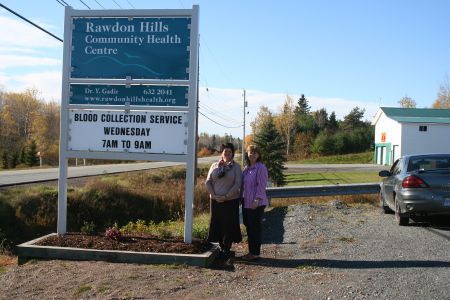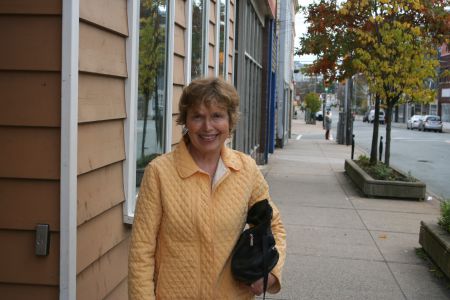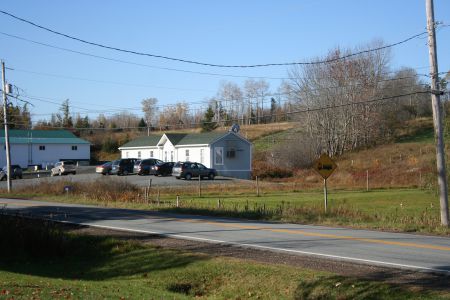A Community Health Centre is where you go if you have a medical issue that needs looking after. You can see a doctor, a nurse or a specialized medical practitioner.
The innovative way Community Health Centres deliver healthcare is what makes them stand apart from a regular doctor's office or walk-in clinic.
This story features two such Community Health Centres, one in Rawdon Hills in rural East Hants, the other one in North End Halifax. Altogether there are about forty such Community Health Centres in Nova Scotia.
Rawdon Hills is a small rural community of maybe fifty houses, a United Church, a post office, a school, that's pretty well it.
The North End Community Health Centre, in contrast, is on busy Gottingen Street in Halifax, one of Atlantic Canada's most urban addresses.
Yet the two clinics have more in common than the different locations would suggest.
Teamwork is prominent in all Community Health Centres. A doctor associated with a Community Health Centre never works alone but shares the patient care with nurses, occupational therapists, dieticians, mental healthcare providers, whatever the community needs may be.
For the North End Community Health Centre on Gottingen Street for instance, the team that looks after patients includes, among others, a dentist, a nutritionist, somebody who provides foot care, and a social worker who helps low income patients deal with power cut offs, problems with landlords and the like.
The North End clinic also operates a medical outreach team for people who are homeless or insecure in their housing.
Most regular family practitioners charge MSI, our provincial health insurance system, for each patient they see. This is why these doctors will often only allow a patient to raise so many health issues per visit.
In contrast, all staff of Community Health Centres are salaried, rather than paid a set fee for each patient they see. That includes doctors.
For Kathy Blois, who runs the Rawdon Hills Community Health Centre in rural East Hants, that doctors are salaried is an important difference. To her it underlines the unique philosophy that inspires Community Health Centres.
“At the ground level we are working with our population, we service patients and clients according to their needs,” says Blois. “If you went to a walk-in clinic or a fee for service doctor you typically are in for a particular issue. With us the appointment does not need to be just 10 or 15 minutes, and prevention becomes much more prominent.”
“You may have a whole list of health issues and we will take a look at the list and work with you so that you have an impact on your own health. We may ask you about items that aren't even on your list,” Blois says.
What also distinguishes Community Health Centres from a regular doctor's office is how causes of sickness rooted in society are considered part of the mandate.
That there is poverty in the North End has been well documented over the years. But poverty is just as much a reality in rural East Hants, says Blois.
And poverty can make you sick.
“Poverty is the most potent determinant of health,” says Margaret Casey, Board Chair of the North End Community Health Centre. “Poverty of course leads to all sorts of other things. Insecure housing, no access to adequate nutrition, difficulty sometimes, because of all these other factors, to stay in school.”
And all these issues impact on employment, so that it becomes a cyclical problem, Casey says.
“One thing that is hugely prevalent among insecurely housed people and people who live in chronic poverty, are various degrees of mental health issues, and we try to help with those,” says Casey.
Blois for her part mentions a high percentage of alcoholism, chronic diseases, and addictions as being all too common in rural Nova Scotia.
The recognition that many diseases to some extent have social causes is central to the Community Health Centres philosophy.
This is also why some of the programs that the Health Centres offer have seemingly little to do with the practice of medicine.
One of the services that rotates through the Rawdon Hills clinic is the Hants County Community Access Network. This is an organization that helps people overcome barriers to employment and a healthy life, regardless of whether those barriers are psychological, physical or caused by a lack of money.
Hope Blooms, an initiative of the North End Community Health Centre, is another such example. At-risk youth grow their own food in a community garden and take it to market. Not a project that you would associate with a medical clinic.
“Confidence is transformative,” says Casey, talking about Hope Blooms. “We have all seen it in front of our eyes. It is kind of a micro illustration, really, of what should be happening in the whole society if you could extend it out.”
The forty Community Health Centres in Nova Scotia all share this focus on prevention and teamwork. All are not for profit and firmly rooted in their communities.
Blois and Casey are convinced that this emphasis on prevention and sensitivity to a community's needs is very effective and actually saves money. They also believe that much more could be accomplished.
But money is a problem for almost all Community Health Centres in Nova Scotia, says Blois.
Typically the community is on the hook for paying for the building, its upkeep, and all operational costs, the receptionist and so on. Only the doctors and nurse practitioners are paid for through our provincial health insurance, Blois explains.
“It's like a turnkey operation,” says Blois, who is also the Chair of the Nova Scotia Federation of Community Health Centres. “The doctors and nurse practitioners come in to a facility that is fully stocked and fully staffed.”
This is why fundraising is a major activity in all Community Health Centres.
Fundraising in Rawdon Hills is mostly done through a wildly popular dinner theatre event that completely sells out every year. But more money is needed, and the Rawdon Hills Health Centre has outgrown the space it occupies, Blois explains.
The North End clinic does receive some operational funding from the province through Capital Health. But Casey also argues that more money is needed, and once again space is an issue.
In Halifax fundraising is more difficult. The competition is stiff, and there is only so much money to go around.
“There is also bit of a sense that people don't really want to look at these things, and would rather give to things that are more appealing in some way or another,” says Casey.
The Nova Scotia Federation of Community Health Centres is asking the provincial government for additional funding for all Community Health Centres in Nova Scotia. It also wants a more consistent and equitable approach. When it comes to funding it's a bit of a patchwork right now, says Blois.
It hopes to start that dialogue with the new government soon.
“I don't think it is well understood how important these kinds of on the ground collaborative approaches are,” says Casey.”I think it is beginning to be understood. It is more expensive up front. But the savings are immeasurable.”





